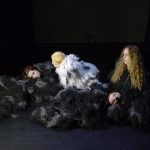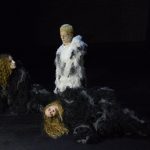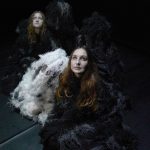
ROMEO AND JULIET concert
ROMEO AND JULIET concert
Carla Delphrates + Lenz Foundation
SHAKESPEARE < 1616-2016
Project for the four hundredth anniversary of the death of William Shakespeare
Romeo and Juliet Concert proposition of the composer Carla Delfrate and Lenz Foundation for actresses' voices only is a work aimed at enhancing the expressiveness and sonority of the tragic word of the work through a harsh and extreme score and scenic rendering. The language-monument of Romeo and Juliet fulfills the tragic destiny of the two heroes, the original act of their lips and tongue, intolerant of anything other than the funereal and canine words of Old English and rises on the sonic pedestal of the musical score. In the Concerto the text is the victim of its bare syllable.
The powerful explosion of the word does not find a meaning towards which to direct itself and disintegrates into the animal verb. It is through growling language that the Love death Of Romeo and Juliet, their love and their tragic end, they are inextricably linked, like two aspects of one thing. Romeo and Juliet Concert it is part of a complex Lenz Foundation project dedicated to William Shakespeare, created on the occasion of the four hundredth anniversary of his death.
Lenz's theatrical language is based on an extreme and radical fidelity to the word of the text. In the search for the heroic state of the actor, theater takes shape in the oscillation between weakness and strength, vulnerability and power of the speaking body. In a long cycle of research dedicated to Shakespearean dramaturgy, Lenz created the staging of numerous monument works: Romeo and Juliet, A Midsummer Night's Dream, Richard II, Ur-Hamlet, Hamlet, Macbeth, Re Lear, Shakespears Geist, monologue by the German playwright Jakob Lenz inspired by the great theater actor David Garrick. Romeo and Juliet Concert it is part of a complex Lenz Foundation project dedicated to William Shakespeare, created on the occasion of the four hundredth anniversary of his death.
The extreme state of feeling, the passion that moves and pushes towards death, the tragic killing of the hero, the condition of dreams and reality, the mystery of the human condition, they are generated by the act of speaking, the full body of the voice. The mythical boundary of Shakespeare's works is marked by two fundamental lines: the original language and the rebirth of the word in the actor's body. The foreign but not foreign sound of the English language of the late sixteenth century, crossing the actor's body in exile, can return to sing the verse of nostalgia in the truth of the scene.
Polyphonic bridge between ancient and modern, between general and particular, Shakespeare's language is a powerful echo of the art of theater in contemporaneity and in the renewal of language.
Poetry, playwriting, regia, actor's work – between the twentieth and twenty-first centuries – again to research the conditions of birth together, of the unveiling, of existence and non-existence, of the enigma and the impossibility of representing.
ROMEO AND JULIET
da William Shakespeare
Translation, playwriting, imagoturgy | Francesco Pititto
Regia, installation , costumes | Maria Federica Masters
Musica | Carla Delphrates
Interpreters | Valentina Barbarini | Alessia Galeotti, Sandra Soncini, Elena Sorbi, Carlotta Spaggiari
Luci | Alice Scartapacchio
Production | Lenz Foundation
– Signifiers and meanings
by Daniel Rizzo, Persinsala_11 December 2016
(…) Maintaining the universal nature of the original manifesto (the tragic) next to the epochal (desperation), Maria Federica Maestri and Francesco Pititto decide to neutralize Romeo, depriving him of the evidence of the body, and put it in brackets, handing over the entire burden of representation to the prismatic restitution of a language that translates scenically into Juliet's amorphous body shattered into five experimental and depsychologized characters, in individuals dramatically reduced to echoes and dreamy moods, protagonists of a drama that explodes in the drastic and emotional acting particularity rendered through the universality of the phonemic. (…)
http://teatro.persinsala.it/romeo-and-juliet-natura-dei-teatri/34794











